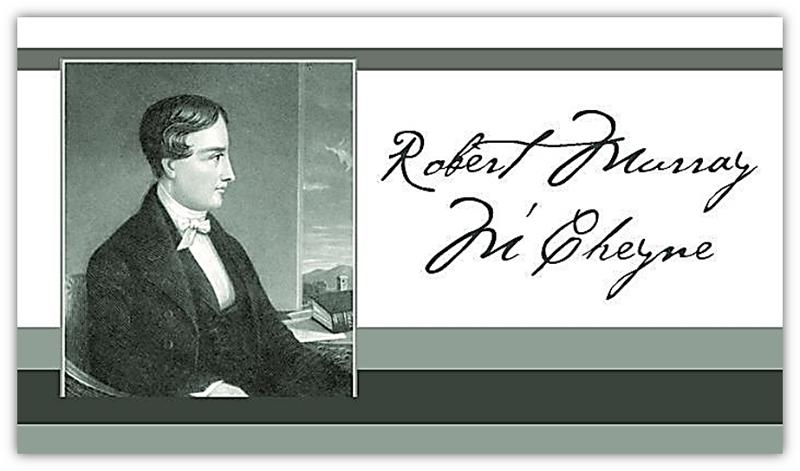The Piety of Robert Murray M'Cheyne Reflections on the Bicentennial of his Birth
The Piety of Robert Murray M'Cheyne Reflections on the Bicentennial of his Birth

The personal history of Robert Murray M‘Cheyne, born two hundred years ago, has been recorded for the church in the famous biography by Andrew Bonar. These memoirs detail the life of Rev. M‘Cheyne and show what made him a great preacher of God, and how he was used by God for the furthering of His kingdom in Scotland. The most significant aspect of M‘Cheyne’s life that stands out is his personal piety. He reflected this in every aspect of his life. Preachers of today can learn much from M‘Cheyne’s personal life in a day when personal holiness for preachers and pastors is at a premium as they struggle with conformity to the world. M‘Cheyne’s godly example provides a healthy antidote to the competition of a world that seeks to encroach on a minister’s life, study, and pulpit. He stands as one of the most powerful figures in history. He was a man who walked day-by-day with his God, sought the eternal welfare of his people with tears, and combined these two in a passionate ministry, pleading for people to repent and be reconciled to God because their souls were at stake. This article (and two to follow in subsequent issues) seeks to examine how M‘Cheyne’s personal piety was reflected in his preaching and how that might offer encouragement to men who struggle in the milieu of 21st century ministry.
Robert Murray M‘Cheyne was born in Edinburgh on May 21, 1813.1 He was born into a solid middle class family during the time of the Industrial Revolution. Young Robert was a talented youngster and excelled at his studies, learning Greek, Latin, and Hebrew as well as possessing a poetic mind and literary wit.2 These gifts would serve him in his later ministry for which God was preparing him. The people around him often commented on his soft, caring, and compassionate disposition, which no doubt would impact his care and desire to urge people in his preaching to flee to Christ for their souls’ sake.3 During his early years, M‘Cheyne was deeply affected by the death of his brother David. Young Robert sorely missed the presence of the brother who had gone before him to his heavenly Father, yet he also sensed that he was missing what David possessed in terms of spiritual peace and reconciliation with God.4 The death of his brother began to effect a profound change in the heart and life of Robert. Bonar comments that this was the year, 1831, M‘Cheyne’s eighteenth year, that the Spirit was working in him,
If this was not the year of his new birth, at least it was the year when the first streaks of dawn appeared in his soul.5
M‘Cheyne himself comments on this change of heart and life the year after his brother died,
This day eleven years ago, I lost my loved and loving brother, and began to seek a Brother who cannot die.6
M‘Cheyne eventually found that Brother, or rather this Brother found him. A struggle ensued between Robert’s heart and the world which beckoned him with its seemingly alluring pleasures and trysts. He records in his journal the difficulty he had in this struggle:
A thorn in my side – much torment ... absented myself from the dance; upbraidings ill to bear. But I must try to bear the cross.7
Despite his struggles and prevailing sins, M‘Cheyne records in his Memoirs that Jesus had become his all:
O great God, that didst suffer me to live whilst I so dishonoured Thee, Thou knowest the whole; and it was Thy hand alone that could awaken me from the death in which I was, and was contented to be. Gladly would I have escaped from the Shepherd that sought me as I strayed; but He took me up in His arms and carried me back; and yet He took me not for anything that was in me.8

His own righteousness made void, Robert began to live out of the righteousness of Christ. It is this statement that largely controlled his piety and his preaching, since he was always acutely aware of his own sinfulness, yet also acutely aware of the abundant remedy in the blood and righteousness of Christ.
As young Robert began to grow in his faith, his life was marked by a turn around. Whereas before he would take part in the frivolity of student life and worldly pursuits, his mind and heart now began to turn towards ministry and how he might serve his Master.9 In November 1831 he became a candidate for the ministry in the Church of Scotland. During this initial period of ministerial training he was heavily influenced by Thomas Chalmers.10 Chalmers was instrumental in shaping M‘Cheyne’s thought and had a profound impact on many of M‘Cheyne’s contemporaries. All these circumstances contributed to the development, maturation, and legendary piety instilled in M‘Cheyne as he experienced a change both in his own heart and in terms of vocation. His changed life led him to pursue a calling to the ministry to the dismay of his parents, who felt that a man of his caliber would make a good lawyer, which was at that time more socially acceptable.11 Despite familial pressures to the contrary, he dedicated his heart and soul, mind and body to his Master out of gratitude for deliverance from sin and bondage.
His call to the ministry and personal piety grew simultaneously as the Lord continued His good work in M‘Cheyne’s life. He increasingly began to detest his former life, seeing the emptiness and futility of living for self.12 He was gradually being molded and fitted for service in the Master’s kingdom. He began to read biographies of men who had gone before him to foreign mission outposts and commented on their godly examples,
Would I could but imitate him (Henry Martyn), giving father, mother, country, house, health, life, all for Christ. And yet, what hinders? Lord purify me, and give me strength to dedicate myself, my all, to Thee.13
This statement comprehends M‘Cheyne’s personal piety as well as his preaching. Although he himself felt that he was not dedicated to Christ with his all, yet his sermons and personal life stand as perpetual testimonies of his faithfulness to his Savior.
This faithfulness in M‘Cheyne’s life translated into a life of deep and holy piety which burned deep within his soul. He lived constantly with a sense of his own unworthiness, yet rejoiced at the fact that he too was purchased heart, soul, mind, and body with the blood of the Lord Jesus Christ. When his former sins came to plague his mind and conscience he reflected on his salvation in Christ,
But perhaps my old sins are too fearful, and my unbelief too glaring? Nay; I come to Christ, not although I am a sinner, but just because I am a sinner, even the chief.14
In one breath M‘Cheyne decried his own sinfulness and in the next breath proclaimed the sufficiency of Christ for such a sinner as himself. He records this experience in this way:
Much broken under a sense of my exceeding wickedness, which no eye can see but Thine. Much persuasion, of the sufficiency of Christ, and of the constancy of His love.15
The believer of today has much to learn from M‘Cheyne in this area; though sin still clings to this body, yet Christ is sufficient to forgive that sin. The question then arises as to how Robert cultivated this deep sense of his own sinfulness as well as such a deep appreciation for Jesus Christ. He did so through careful preparation of his heart and mind each day, especially before preaching.
Shortly after his conversion he relates his experiences of reading the Bible on a Sabbath evening in his Memoirs: “Reading. Too much engrossed, and too little devotional. Preparation for a, fall. Warning. We may be too engrossed with the shell even of heavenly things.”16 At another place he records, “Mind quite unfitted for devotion. Prayerless prayer.”17 Day by day he records his struggles to maintain a rich devotional life. Perhaps the question he asks in one of his entries is most telling: “Humble, purpose-like reading of the word omitted. What plant can be un-watered and not wither?”18

Although it seems that M‘Cheyne never had a moment of communion with his Lord, this is not the case, but these entries of his diary indicate that he had a keen sense of his proclivity to become lax in the area of personal devotion. He recognized that a personal relationship with God through reading and meditation of His Word and earnest prolonged prayer were a key to a vibrant and robust spiritual life. He did have very positive experiences that he records in his diary, which show that though he often mourned his lack of fervency and preparedness in personal devotion he nevertheless did taste and see that the Lord is good. One of his entries reads, “Sabbath evening. Much prayer and peace. Reading the Bible only,”19 demonstrating that prayer, and Scripture were the lifeblood of his walk with the Lord.
Confession of sin was also an essential part of M‘Cheyne’s devotional life as indicated in his section on “Personal Reformation” in his memoirs. M‘Cheyne firmly believed that he needed to maintain a clear conscience before God, which could only be achieved through a faithful self-examination and confession of sin. His words are convicting when he states the need and motivation for confession:
I ought to go to Christ for the forgiveness of each sin. In washing my body, I go over every spot, and wash it out. Should I be less careful in washing my soul? I ought to see the stripe that was made on the back of Jesus by each of my sins. I ought to see the infinite pang thrill through the soul of Jesus equal to an eternity of my hell for my sins. I ought to see that in Christ’s blood-shedding there is an infinite over-payment for all my sins. Although Christ did not suffer more than infinite justice demanded, yet He could not suffer at all without laying down an infinite ransom.20
His piety was not motivated then for self-improvement only, but was firmly Christocentric and done out of thankfulness and living to the glory of God. The only way to peace and holiness for Robert was to go immediately to Jesus Christ with any sin that was committed.21

Add new comment